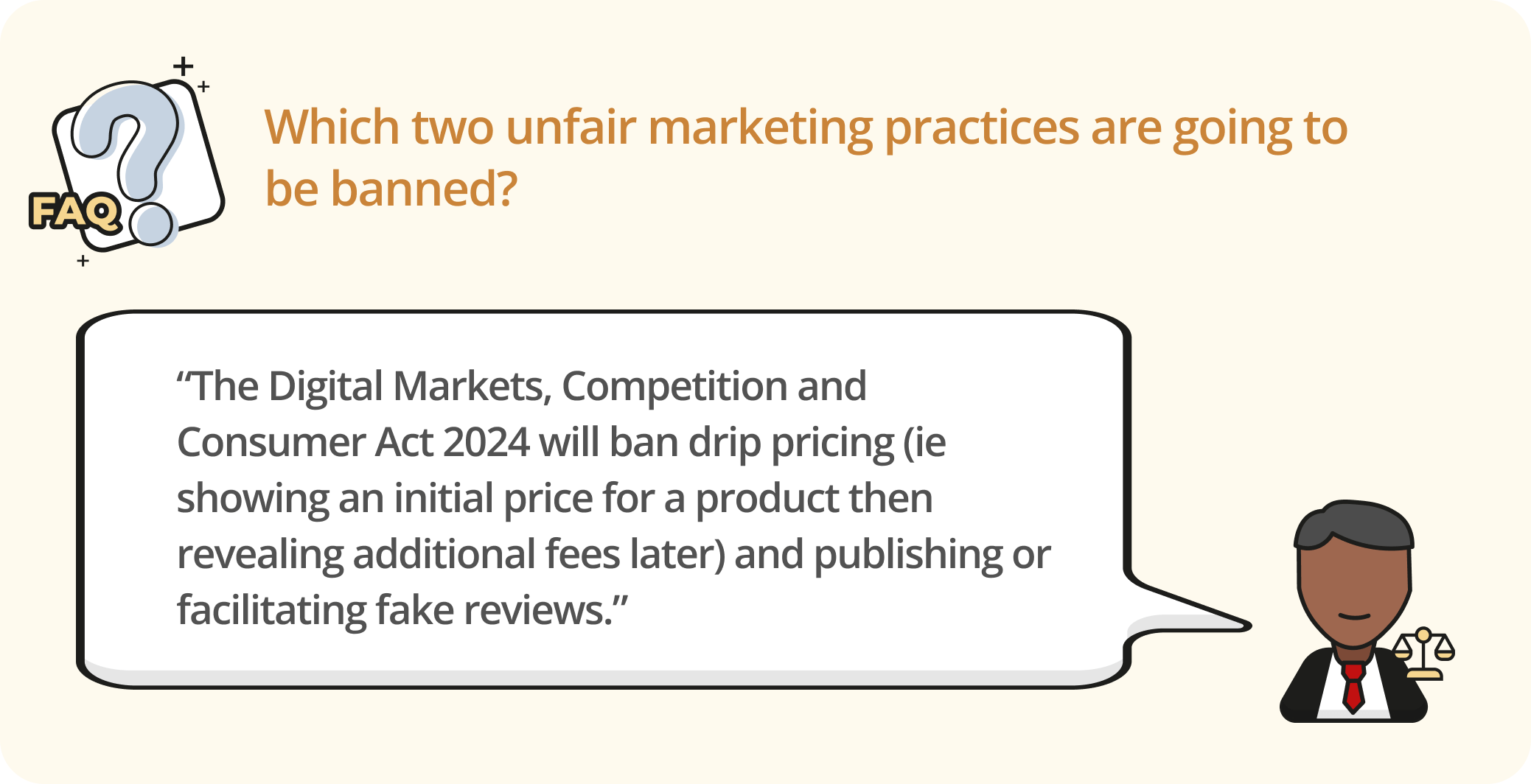What are the main regulations which affect marketing and advertising?
Business to consumer (B2C)
The Consumer Protection from Unfair Trading Regulations 2008 govern business-to-consumer advertising.
They prohibit certain kinds of practices that businesses might use to market their products to consumers. These are referred to as ‘unfair commercial practices’. They include:
-
aggressive sales practices - ie coercion, harassment, or undue pressure used to impair consumers’ freedom to make a well-informed choice, causing them to make a purchase they wouldn’t otherwise have made
-
misleading practices (ie misleading actions or omissions) - such as giving or withholding information in a way that causes deception or confusion. For example, advertising goods that don't exist or making incorrect comparisons to other products
-
limited offers - falsely stating that a product will only be available for a short amount of time (or that it will only be available on certain terms, such as for the listed price, for a limited time)
-
bait advertising - luring in customers with adverts for products at special prices if the products are not in stock or only in very limited supply (eg with the intention of promoting other products to these customers as alternatives)
-
other ‘banned practices’ - for example, displaying false endorsements, falsely claiming a product cures something, or pretending to interact with consumers as another consumer (ie not as a business)
-
the general prohibition on unfair commercial practices - practices that don’t fall into any of the above categories may still be prohibited under this general prohibition if the practice:
-
is contrary to the requirement of ‘professional diligence’ (ie it is conduct that’s not considered honest, good faith practice by a trader), and
-
impairs (or is likely to impair) consumers’ freedom to make a well-informed choice, causing them to make a purchase they wouldn’t otherwise have made
-
Business to business (B2B)
The Business Protection from Misleading Marketing Regulations 2008 govern business-to-business advertising. Some of the rules are:
-
misleading advertising is prohibited (eg advertising should not deceive traders in any way and affect their economic behaviour, for example by persuading them to make a purchase)
-
comparative advertising (ie advertising that identifies a competitor or their product) is only permitted subject to certain conditions being met (eg it should not take advantage of the intellectual property (IP) rights of a competitor or be misleading)
Failure to abide by the Regulations may lead to the company that is advertising their products or services being reported to a local trading standards office, which can result in fines and prosecution.
What are the advertising codes of practice?
Two separate codes of practice, set by the Committee of Advertising Practice (CAP), cover all forms of promotional communications (broadcast or not).
The BCAP Code
The UK Code of Broadcast Advertising applies to advertising on television, radio, and video-on-demand services. It is enforced by the Advertising Standards Authority (ASA). The rules cover issues such as misleading advertising, ensuring that harm and offence are not caused, and protecting children. The BCAP Code essentially puts into effect the Ofcom Broadcasting Code (Ofcom designated ASA as the regulator for broadcast advertising).
The CAP Code
The UK Code of Non-broadcast Advertising and Direct & Promotional Marketing applies to non-broadcast advertising (eg newspaper, magazine, cinema, and online advertising). It covers many of the same issues as the BCAP Code.
Product description rules
One of the important rules in both the CAP and BCAP codes relates to product description. Any claims made about a product or service should be verifiable and all costs - including ongoing or associated costs - must be accurately set out.
What are the direct marketing rules?
Businesses should not contact consumers directly by email, phone, or text (ie via most forms of ‘direct marketing’) unless the consumers they’re contacting have given permission (ie they have ‘opted in’).
The term 'soft opt-in' is sometimes used to describe a rule about direct marketing to existing customers. The idea is that, if an individual bought something from you recently, gave you their details, and did not opt-out of marketing messages even though they could have, they are probably happy to receive marketing from you about similar products or services even if they haven't specifically consented. If they have opted in, they should always be given a way to easily opt-out (eg via an unsubscribe link in emails).
Anyone conducting telesales activity should check with the Telephone Preference Service (TPS) to find out if any numbers have opted out. For more information on the TPS and telesales, read How does the TPS regulate text message marketing? and Best practices for text message marketing.
For more information on direct marketing rules, read the government’s guidance on direct marketing and the Information Commissioners’ Office’s (ICO’s) direct marketing guidance.
What are the new laws on drip pricing and fake reviews?

Since 6 April 2025, the new Digital Markets, Competition and Consumer Act 2024 has banned more unfair commercial practices, including:
-
drip pricing and hidden fees - businesses must not market products to consumers by showing an initial price for a product and then revealing additional fees later in the checkout process. Advertised prices will have to include the total price payable for an item any potential mandatory fees that could be added later
-
fake reviews - businesses must not authorise or publish fake reviews and must take reasonable steps to prevent their publication
Additionally, if a business breaches consumer protections law, the Competition and Markets Authority (CMA) now has direct enforcement powers to investigate and take action against them (eg by imposing fines, requiring the business to compensate the consumers, or requiring business to provide an online notice to warn customers).



